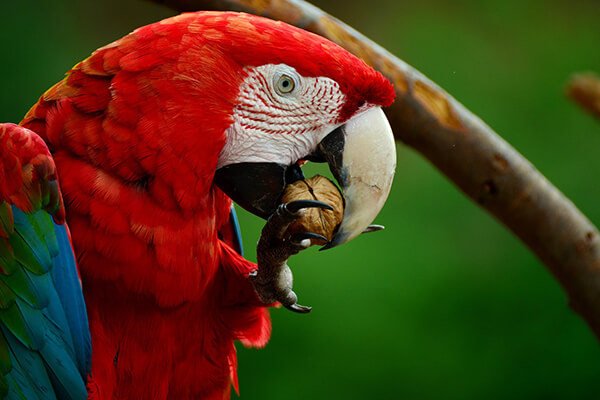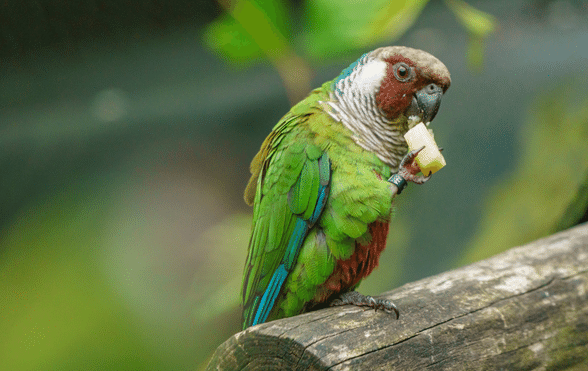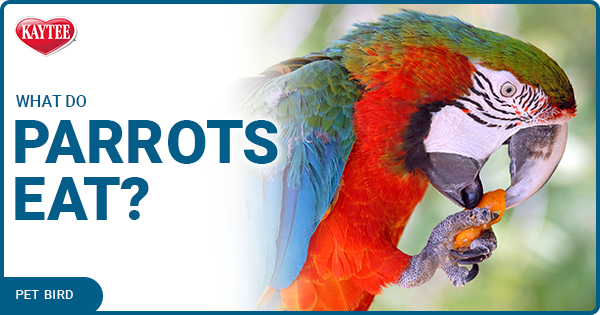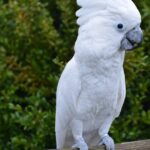Parrots eat seeds, nuts, fruits, vegetables, and some insects. They require a balanced diet for optimal health.
Parrots are colorful, intelligent birds with a varied diet. These vibrant birds thrive on a mix of seeds, nuts, fruits, and vegetables. Some species also enjoy insects and small amounts of meat. A balanced diet is essential for their well-being, ensuring they get the necessary nutrients.
Owners should provide fresh, clean water daily and avoid feeding them harmful foods like chocolate or avocado. Parrots enjoy a diverse menu, which helps keep them healthy and happy. Proper nutrition supports their bright plumage, energetic behavior, and overall longevity. Understanding their dietary needs is crucial for any parrot owner.

Credit: www.anuts.com
Introduction To Parrot Diet
Parrots are vibrant and intelligent birds. They need a balanced diet to stay healthy. Understanding their dietary needs is crucial. It helps them thrive and live longer.
Importance Of A Balanced Diet
Parrots need a variety of foods. A balanced diet ensures they get essential nutrients. Their diet should include:
- Fruits – Apples, bananas, and berries
- Vegetables – Carrots, broccoli, and spinach
- Seeds and Nuts – Sunflower seeds, almonds, and walnuts
- Pellets – Specially formulated parrot pellets
This mix keeps parrots happy and healthy. It prevents deficiencies and promotes overall well-being.
Common Feeding Mistakes
Many parrot owners make feeding mistakes. These errors can harm their feathered friends. Avoid these common mistakes:
- Too Many Seeds – Seeds are high in fat. They should be given in moderation.
- Lack of Variety – Parrots need a diverse diet. Don’t stick to one type of food.
- Feeding Junk Food – Avoid giving parrots processed foods. They can be harmful.
- Ignoring Fresh Water – Always provide clean, fresh water. Hydration is vital for parrots.
By understanding and avoiding these mistakes, you can ensure your parrot stays healthy and happy.
Fruits Parrots Love
Parrots enjoy a diverse diet. They have a special love for fruits. Fruits offer essential nutrients. They add variety to a parrot’s diet.
Safe Fruit Options
Not all fruits are safe. Here are some good choices:
- Apples (without seeds)
- Bananas
- Blueberries
- Oranges
- Grapes
- Mangoes
- Papayas
Always wash fruits well. Remove seeds and pits. These can be harmful.
Nutritional Benefits
Fruits provide many benefits. They give vitamins and minerals. Here is a table showing some benefits:
| Fruit | Vitamin | Benefit |
|---|---|---|
| Apples | Vitamin C | Boosts immune system |
| Bananas | Vitamin B6 | Good for heart health |
| Blueberries | Antioxidants | Reduces inflammation |
| Oranges | Vitamin C | Improves skin health |
Fruits also keep parrots happy. They enjoy the sweet taste. Feeding fruits can be a fun bonding time.
Vegetables For Parrots
Parrots thrive on a balanced diet. Vegetables play a crucial role in their nutrition. Including a variety of veggies can ensure a healthy and happy parrot.
Best Vegetables
Certain vegetables are ideal for parrots. These vegetables provide essential vitamins and minerals.
- Carrots: Rich in Vitamin A, great for vision.
- Broccoli: High in calcium and Vitamin K.
- Spinach: Contains iron and antioxidants.
- Bell Peppers: Packed with Vitamin C.
- Sweet Potatoes: Good source of fiber and beta-carotene.
Preparation Tips
Proper preparation of vegetables is key to their benefits. Follow these tips to prepare veggies for your parrot.
- Wash Thoroughly: Clean all vegetables to remove pesticides.
- Chop Small: Cut into small, bite-sized pieces.
- Steam Lightly: Steaming can make vegetables easier to digest.
- Serve Fresh: Always offer fresh vegetables to your parrot.
- Remove Leftovers: Discard uneaten vegetables after a few hours.
Here’s a handy table summarizing the best vegetables and their benefits:
| Vegetable | Benefit |
|---|---|
| Carrots | Vitamin A |
| Broccoli | Calcium, Vitamin K |
| Spinach | Iron, Antioxidants |
| Bell Peppers | Vitamin C |
| Sweet Potatoes | Fiber, Beta-carotene |
Seeds And Nuts
Parrots love seeds and nuts. Both make up a significant part of their diet. Let’s explore healthy seed choices and nut varieties for your feathered friend.
Healthy Seed Choices
Seeds are vital for parrots. They provide essential nutrients and fats. Here are some healthy seed options:
- Sunflower Seeds: Packed with vitamins and minerals.
- Safflower Seeds: Lower in fat, high in protein.
- Millet: Great for small parrots.
- Hemp Seeds: Rich in omega-3 and omega-6 fatty acids.
- Flax Seeds: Boosts immune system with omega-3.
Nut Varieties
Nuts are another favorite. They are high in protein and healthy fats. Here are some suitable nut varieties:
- Almonds: Full of vitamin E and fiber.
- Walnuts: Rich in antioxidants and omega-3.
- Pistachios: Provide protein and healthy fats.
- Cashews: High in vitamins and minerals.
- Brazil Nuts: Excellent source of selenium.
Ensure you feed them in moderation. Too many seeds or nuts can lead to obesity. Balance their diet with fresh fruits and vegetables.
Grains And Legumes
Parrots have a diverse diet that includes grains and legumes. These foods provide essential nutrients. They help parrots stay healthy and energetic. Let’s explore the types of grains and the benefits of legumes for parrots.
Types Of Grains
Grains are a staple in a parrot’s diet. They offer a rich source of energy. Here are some common grains you can feed your parrot:
- Millet: Small seeds that are easy for parrots to eat.
- Oats: A good source of fiber and protein.
- Barley: Contains vitamins and minerals.
- Quinoa: High in protein and amino acids.
- Brown Rice: Offers complex carbohydrates and fiber.
Benefits Of Legumes
Legumes are another essential part of a parrot’s diet. They provide protein and other nutrients. Here are some benefits of including legumes:
- High Protein Content: Legumes help build strong muscles.
- Rich in Fiber: Promotes healthy digestion.
- Vitamins and Minerals: Includes iron, magnesium, and potassium.
- Antioxidants: Helps fight against diseases.
Common legumes for parrots include:
| Legume | Benefits |
|---|---|
| Chickpeas | High in protein and fiber. |
| Lentils | Rich in iron and B vitamins. |
| Peas | Contains vitamins A, C, and K. |
| Beans | Provides antioxidants and minerals. |
Including grains and legumes in your parrot’s diet ensures they get balanced nutrition. It keeps them healthy and happy.
Commercial Parrot Food
Providing your parrot with the right diet is crucial for its health. Commercial parrot food offers a convenient and balanced option. It is designed to meet the nutritional needs of parrots. Let’s explore the different types of commercial parrot food available.
Pellets Vs. Seed Mixes
Pellets are a popular choice for parrot owners. They are formulated to provide balanced nutrition. Pellets contain vitamins, minerals, and proteins. They come in various flavors and sizes to suit different parrot species.
Seed mixes are another common option. They often include a variety of seeds, grains, and nuts. While seeds are tasty, they can be high in fat. It’s important to offer a mix of seeds and pellets to ensure a balanced diet.
Reading Food Labels
Reading food labels helps you choose the best products for your parrot. Look for labels that list ingredients and nutritional information. Avoid foods with artificial colors, flavors, and preservatives.
Check for the following on the label:
- Ingredients: Look for whole grains, vegetables, and fruits.
- Protein content: Ensure it’s appropriate for your parrot’s species.
- Fat content: Lower fat content is better for most parrots.
- Vitamins and minerals: These should be balanced and complete.
A balanced diet keeps your parrot healthy and happy. Choose wisely between pellets and seed mixes. Always read the labels to ensure the best nutrition.
Treats And Snacks
Parrots are fascinating creatures with diverse dietary needs. Giving them treats and snacks can be fun. It also strengthens your bond with your feathered friend. But it’s crucial to choose the right treats to keep your parrot healthy and happy.
Healthy Treat Options
Providing healthy treats ensures your parrot gets essential nutrients. Here are some excellent choices:
- Fruits: Apples, bananas, and berries are safe and nutritious.
- Vegetables: Carrots, broccoli, and spinach are rich in vitamins.
- Nuts: Almonds and walnuts are great, but in moderation.
- Seeds: Sunflower and pumpkin seeds are tasty but limit the quantity.
Foods To Avoid
Not all foods are safe for parrots. Avoid these to keep your parrot healthy:
- Avocado: It’s toxic to parrots and can be fatal.
- Chocolate: Contains theobromine, which is harmful.
- Caffeine: Causes heart issues and hyperactivity.
- Alcohol: Extremely dangerous and should never be given.
- Salty Snacks: Excess salt leads to kidney problems.
Here is a quick reference table of safe and unsafe foods:
| Safe Foods | Unsafe Foods |
|---|---|
| Apples | Avocado |
| Bananas | Chocolate |
| Carrots | Caffeine |
| Broccoli | Alcohol |
| Spinach | Salty Snacks |
Feeding your parrot the right treats and snacks ensures they stay healthy. Choose wisely and avoid harmful foods.

Credit: exoticdirect.co.uk
Hydration And Water Needs
Parrots need water to stay healthy and hydrated. Understanding their water needs helps keep them happy. Let’s explore the importance of fresh water and hydrating fruits and vegetables.
Importance Of Fresh Water
Providing fresh water daily is crucial for your parrot. Stale water can harbor bacteria and make your parrot sick. Change their water at least once a day.
Use a clean bowl or water bottle to ensure hygiene. Parrots may also enjoy playing in the water, which helps them stay cool. Always monitor the water level and cleanliness.
Hydrating Fruits And Vegetables
Fruits and vegetables can help keep your parrot hydrated. They contain high water content and essential nutrients. Include these in their diet:
- Cucumbers – High in water and low in calories.
- Watermelon – Provides hydration and vitamins.
- Oranges – Rich in Vitamin C and water.
- Grapes – Sweet and hydrating, but offer in moderation.
These foods supplement their water intake and provide variety. Always wash fruits and vegetables thoroughly before serving.
| Fruit/Vegetable | Water Content |
|---|---|
| Cucumber | 95% |
| Watermelon | 92% |
| Oranges | 86% |
| Grapes | 81% |
Balance fresh water with hydrating foods for optimal health. This ensures your parrot stays well-hydrated and happy.
Feeding Tips And Tricks
Parrots are vibrant, intelligent birds that require a balanced diet. Knowing how to feed your parrot correctly ensures they stay healthy and happy. Below are some feeding tips and tricks to help you provide the best nutrition for your feathered friend.
Creating A Feeding Schedule
Developing a feeding schedule is crucial. It helps maintain your parrot’s routine. A consistent schedule also helps in monitoring their diet.
- Morning Feeding: Provide fresh fruits and vegetables.
- Midday Snack: Offer seeds or nuts in moderation.
- Evening Meal: Serve a mix of pellets and grains.
Always remove uneaten food after a few hours. This prevents spoilage and maintains cleanliness.
Encouraging Picky Eaters
Some parrots can be picky eaters. They might refuse new foods. Here are a few tips to encourage them:
- Introduce New Foods Gradually: Mix small amounts of new food with their favorites.
- Make It Fun: Use foraging toys to make eating an activity.
- Be Persistent: Offer new foods multiple times. Parrots may need several attempts to accept new tastes.
Using these tips, you can create a balanced and enjoyable diet for your parrot. This ensures they receive the necessary nutrients for a healthy life.

Credit: www.anuts.com
Conclusion
A parrot’s diet is diverse, including fruits, vegetables, seeds, and nuts. Proper nutrition ensures a happy, healthy pet. Offer variety and avoid harmful foods. Remember, fresh water is essential. Feeding your parrot correctly promotes longevity and well-being, making your feathered friend thrive.
Keep these tips in mind for optimal parrot care.
Ryan Everhart is a passionate bird enthusiast and blogger, primarily writing on his website, Avian Whispers. His journey into the world of bird blogging began with a deep interest in parrots, a species that captivated his attention for their intelligence and social behavior. Over time, his content expanded to cover a broader range of bird species, offering insights into bird behavior, care, habitats, and conservation.
Ryan is dedicated to educating his audience, which includes both new bird owners and seasoned enthusiasts. His writing is filled with personal experiences, expert knowledge, and practical advice on bird care. Through Avian Whispers, he aims to foster a deeper appreciation for birds, emphasizing their role in nature and the joys of having them as pets.
Starting with articles focused on parrots, Ryan’s work now encompasses a diverse range of topics such as feeding, training, habitat enrichment, and bird health. His love for birds extends beyond parrots, diving into various avian species. His informative and heartfelt writing reflects his commitment to the well-being of birds and the desire to help others connect with these creatures.
As a growing voice in the bird blogging community, Ryan strives to provide a platform where bird lovers can learn, share experiences, and connect over a shared passion for avian life. His blogs are not only educational but also serve as a reminder of the importance of protecting and nurturing the bond between humans and birds.



